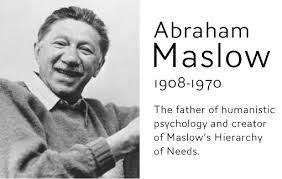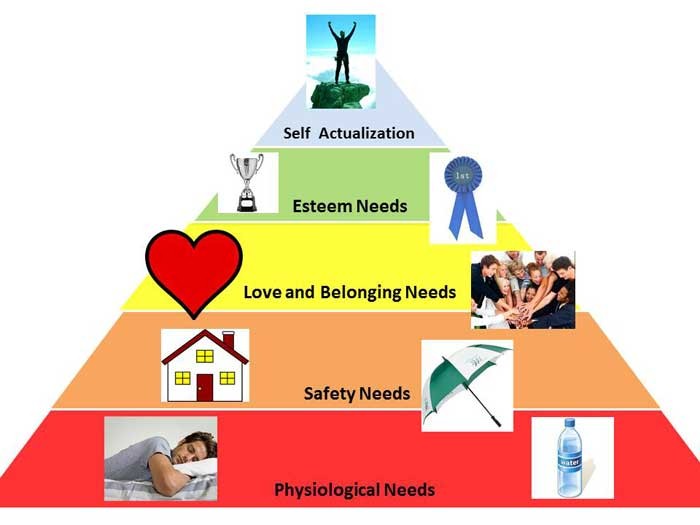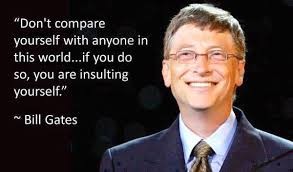Maslow’s Hierarchy of Needs
 Abraham Harold Maslow was an American psychologist who is best known for creating ‘hierarchy of needs’. This is a psychological theory which relies on fulfillment of natural human needs in priority, which culminates in self-actualization (fulfillment of one’s talents and potentialities). Human needs are a never ending series; no sooner one need is fulfilled, the other need arises and this is how man is always busy in struggling to fulfill one need after the other. Maslow felt that people keep on fulfilling their never-ending needs from birth till death which are distinct from rewards and unconscious desires. He illustrated the human needs in hierarchical order in five stages starting from physiological needs to self-actualization needs.
Abraham Harold Maslow was an American psychologist who is best known for creating ‘hierarchy of needs’. This is a psychological theory which relies on fulfillment of natural human needs in priority, which culminates in self-actualization (fulfillment of one’s talents and potentialities). Human needs are a never ending series; no sooner one need is fulfilled, the other need arises and this is how man is always busy in struggling to fulfill one need after the other. Maslow felt that people keep on fulfilling their never-ending needs from birth till death which are distinct from rewards and unconscious desires. He illustrated the human needs in hierarchical order in five stages starting from physiological needs to self-actualization needs.
All of us are motivated from within by needs. All through our life, we struggle to fulfill our needs. For example, if you are hungry and thirsty, you will tend to try to take care of the thirst first. After all, you can do without food for weeks, but you can only do without water for a couple of days! Thirst is a “stronger” need than hunger. Similarly, if you have not slept for two days and you are hungry, again you will tend to first sleep when you will get chance, because sleep is “stronger” need than hunger. Each individual’s desires and wants vary as per his character. Maslow says that only when the lower order needs of physical and emotional well-being are satisfied, we reach the higher ranking needs of mastery, independence and realization of personal potential.
The deficiencies in fulfillment of needs motivate people to achieve their unmet needs. The longer the time is taken to attain, the needs become stronger. For example, the longer a person goes without a rise in his salary, the more he gets aggravated and works harder to achieve his desire. Every person is capable and has the innate desire to move up the hierarchy of needs toward the level of self-actualization. But, the fact is that most of us have to struggle with many failures to meet our lower level needs. For example, completing graduation in desired stream, getting suitable job, coping up challenges in job, buying a house, disrupted progress in life due health, marriage, kids, their education, problem in matrimony, higher education etc etc – the list is big. The needs keep fluctuating between lower level and higher level irrationally. And, this disruption of needs keeps a person busy all through his life. Maslow noted that only one in a hundred people become fully self-actualized.
Maslow described the needs as per hierarchy as follows:
 1. The physiological needs: These include the need of breathing, satisfying hunger, thirst, sleep, rest, and sex.
1. The physiological needs: These include the need of breathing, satisfying hunger, thirst, sleep, rest, and sex.
2. Safety needs: These include protection from bad elements in society, security, law and order, stability, strength and freedom from fear.
3. Social needs: These include friendship, family, friend’s circle, work group, community belonging etc, in short love and kindness.
4. Esteem needs: This category includes achievement, mastery, independence, status, dominance, prestige, self-respect, and respect from others.
5. Self-Actualization needs: This is at the peak of need pyramid. This includes realizing personal potential, self-fulfillment, seeking personal growth and peak experiences.
Maslow felt that there was a clear distinction between gaining love and gaining respect or esteem. He felt that people get respected for their exceptionality and mastery. As individuals, we naturally wish to excel or be exceptional, to be noticed for our unique talents and capabilities. Each one has some measure of self-esteem and confidence; at some point in time, we try to raise the bar of our performance, and once we achieve mastery we automatically gain the psychological freedom to be creative and grow further. The growth gives us wisdom and the wisdom makes us generous to others.
While the theory is generally portrayed as a fairly rigid hierarchy, Maslow noted that the order in which these needs are fulfilled need not always follow this standard of succession. For example, for some individuals, the need for self esteem is more important than the need for love. Age, race, cast, creed, gender, height, weight, money, status has got nothing to do with the order of achieving each need.
 Abraham Maslow also stated that self-actualized people are those who are satisfied with themselves and doing all that they are capable of. Maslow believed self-actualization could be measured through the concept of peak performance or experiences. This occurs when a person experiences all fulfillments in life which gives sense of euphoria, joy and wonder. He also said these people are unusually creative, spontaneous and have an unusual sense of humor. In 1970 he published a list of people whom he felt were self-actualized people. The list included Einstein, Mother Teresa, M.K.Gandhi, Beethoven, Lincoln, and Eleanor Roosevelt and… Abraham Maslow himself.
Abraham Maslow also stated that self-actualized people are those who are satisfied with themselves and doing all that they are capable of. Maslow believed self-actualization could be measured through the concept of peak performance or experiences. This occurs when a person experiences all fulfillments in life which gives sense of euphoria, joy and wonder. He also said these people are unusually creative, spontaneous and have an unusual sense of humor. In 1970 he published a list of people whom he felt were self-actualized people. The list included Einstein, Mother Teresa, M.K.Gandhi, Beethoven, Lincoln, and Eleanor Roosevelt and… Abraham Maslow himself.
Maslow felt, a person is always ‘becoming’ and never remains static. The fluctuations in life do not allow a person to remain stagnant. As each person is unique the motivation for self-actualization leads people in different directions. While for some people self-actualization can be achieved through creating works of art or literature, for others it comes through achieving great profit in business, for some it comes through sports, so on and forth. It is worth noting that self-actualization is a continual process of ‘becoming’ rather than a perfect state which we often see in movies ‘happy ever after.’ Success involves many ups and downs, it means going from failure to failure – yet not giving up.
The self-actualizers have few characteristics which allow them to stand out such as they are efficient, they accept other for what they are, they are humorous, they look at life objectively, and they are highly creative people. Such people are child like inquisitive, have great grasping power and great amount of concentration, they don’t dither from trying out new things, they listen to their heart, avoid pretense of any sort, and take responsibility for failures. Although different people achieve self-actualization in different ways (each one has his own unique way), they tend to share certain characteristics. Maslow said that there are no perfect human beings. Remember, Maslow did not equate self-actualization with perfection. Self-actualization merely involves achieving ones potential.
 The greater a person suffers in life, he becomes more realistic. When somebody is offered things on platter, he/she loses value of what has been received by him. I think life is a kind of party. Lots of people come in your life – some you invite and some come on their own. Some leave early; some stay with you all life; some laugh with you, some laugh at you, and some show up for the heck of it. All, but in the end, each one of these teach you something. Each one changes your learning curve. Some create a mess and some help you to clear the mess. Those who help you clear the mess; most of the times aren’t responsible even little for the mess. These people are your real friends in life. In my opinion, you need at least one such friend to reach your self-actualization.
The greater a person suffers in life, he becomes more realistic. When somebody is offered things on platter, he/she loses value of what has been received by him. I think life is a kind of party. Lots of people come in your life – some you invite and some come on their own. Some leave early; some stay with you all life; some laugh with you, some laugh at you, and some show up for the heck of it. All, but in the end, each one of these teach you something. Each one changes your learning curve. Some create a mess and some help you to clear the mess. Those who help you clear the mess; most of the times aren’t responsible even little for the mess. These people are your real friends in life. In my opinion, you need at least one such friend to reach your self-actualization.













































